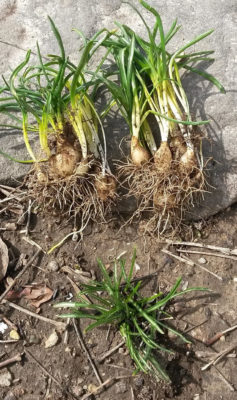by Besa Schweitzer
Wild Ones St. Louis Chapter member
Originally published on Mar 4, 2018 on Besa’s blog Besa Grows Wild
Republished here with Besa’s permission
The Star of Bethlehem wins March’s least favorite plant of the month award. I first saw the Star of Bethlehem (Ornithogalum umbellatum ) at Emmenegger Park on a trip to look for spring flowers. When I looked it up in my wildflower book I was surprised to see that it wasn’t a native flower. Soon I recognized Star of Bethlehem in a garden I was caring for and decided to be a benevolent gardener and let it be to see how it grew.
This flower is one of the first green shoots out of the ground in late February and is a very welcome sight, soon after that it has a simple white flower. The leaves wither away in the summer heat and then there is no sign of the plant until next spring.
Well, it spreads quickly! The patch of flowers was doubled in size the next year with a few small patches in other parts of the yard. Star of Bethlehem grows from a bulb that creates bulblets and can form dense colonies. The bulbs are very hardy and if you dig them up and put them in the compost you will grow the evil plant everywhere you spread your compost.
The most effective way to remove Star of Bethlehem is to dig out each little bulb in March as soon as they emerge. They must be dug out carefully to not break off the leaves or leave any bulblets in the ground. When taking the dirt off the plants do not put the dirt back into an unaffected area because a small missed bulb will start a new population.
Ineffective methods of removing the Star of Bethlehem that I have tried include;
- composting
- repeated pulling or mowing of the leaves
- burying it a foot deep
- outcompeting with aggressive plants
- solarizing
Digging out each bulb and removing it from the garden is the only way I know to kill it and pieces will be missed so infected areas will need to be cleared for several years. Learn to recognize this spring ephemeral and take early action when spotted. It is so much easier to remove it now than when it is completely tangled up with roots of other garden plants. March is a great time to get out and look for many invasive species and take early action.



thanks, I’ve got some, less than last year and it’s a bugger – your hints are helpful and I’ll keep “working on it”…invasive for sure…